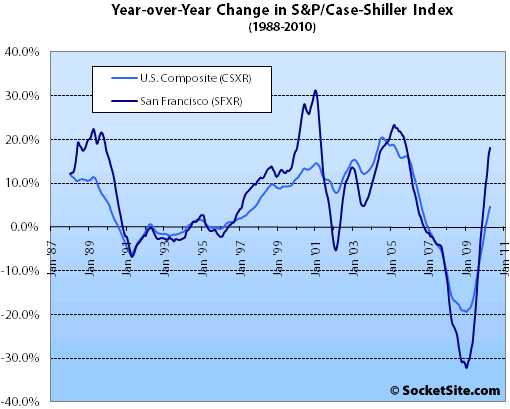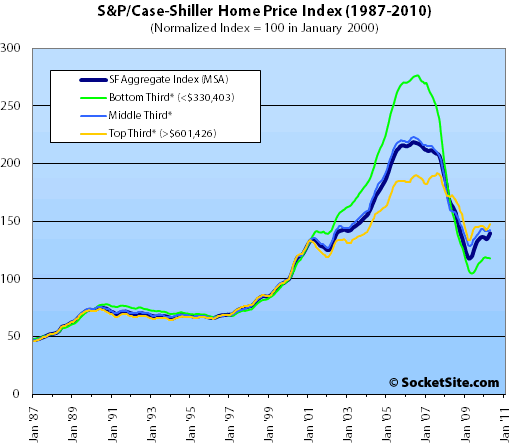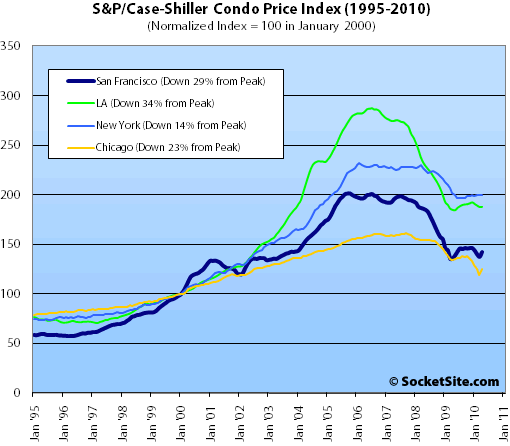
According to the April 2010 S&P/Case-Shiller Home Price Index, single-family home prices in the San Francisco MSA rose 2.2% from March ’10 to April ’10, down 36.0% from a peak in May 2006 but up 18.0% year-over-year.
For the broader 10-City composite (CSXR), home values rose 0.7% from March to April reversing a five month slide but remain down 30.5% from a peak in June 2006 (up 4.6% year-over-year).
“The month-over-month figures were driven by the end of the Federal first-time home buyer tax credit program on April 30th. Eighteen cities saw month-to-month gains in April compared to six in the previous month. Miami and New York were the two that fared the worst in April compared to March. New York is the only MSA to have posted a new relative index low with April’s report.” says David M. Blitzer, Chairman of the Index Committee at Standard & Poor’s.
“Other housing data confirm the large impact, and likely near-future pullback, of the federal program. Recently released data for May 2010 show sharp declines in existing and new home sales and housing starts. Inventory data and foreclosure activity have not shown any signs of improvement. Consistent and sustained boosts to economic growth from housing may have to wait to next year.”
On a month-over-month basis prices fell for the bottom price tier but rose for the top two tiers for single-family homes in the San Francisco MSA.

The bottom third (under $330,403 at the time of acquisition) fell 0.3% from March to April (up 12.0% YOY); the middle third rose 1.1% from March to April (up 11.0% YOY); and the top third (over $601,426 at the time of acquisition) gained 2.5% from March to April (up 10.7% YOY).
According to the Index, single-family home values for the bottom third of the market in the San Francisco MSA remain just below September 2000 levels having fallen 57% from a peak in August 2006, the middle third is back to June 2002 levels having fallen 36% from a peak in May 2006, and the top third is between March and April 2004 levels having fallen 23% from a peak in August 2007.
Condo values in the San Francisco MSA rose 3.5% from March ’10 to April ’10, up 4.7% on a year-over-year basis and down 29.4% from an December 2005 high.

Our standard SocketSite S&P/Case-Shiller footnote: The S&P/Case-Shiller home price indices include San Francisco, San Mateo, Marin, Contra Costa, and Alameda in the “San Francisco” index (i.e., greater MSA) and are imperfect in factoring out changes in property values due to improvements versus appreciation (although they try their best).
∙ Home Prices Do Not Yet Show Signs of Sustained Recovery [Standard & Poor’s]
∙ March Case-Shiller Index: Mixed Messages For San Francisco MSA [SocketSite]
∙ As Expected, Another Unexpected Decline For Existing Home Sales [SocketSite]
∙ Pace Of New Home Sales In The U.S. Hits Historic Low [SocketSite]
SF is one of the few metro areas that has done well these last 12 months. (off the top of my head I think San Diego and Minneapolis were the other two.. and there may have been 1-2 more as well).
it’ll be interesting to see what happens now that the FTHB credit and the Fed purchases of Treasuries and MBS have stopped. of course, we’ll have to wait until August to see what the July numbers show, since the FTHB credit will affect existing home data through June 30.
I find it interesting that the low end is struggling in SF MSA but the upper end is doing better. Not sure why, but some GUESSES would be that the FTHB credit affected the lower tiers more than the upper tiers (which is obvious of course), and perhaps because in this recession the lower socioeconomic classes have been hit harder than the upper socioeconomic classes. it also of course could simply be that the lower SE classes couldn’t hold on to their homes and thus there are more short sales/foreclosures in that segment.
it’ll be “fun” to watch this over the next 12 months.
Consistent and sustained boosts to economic growth from housing may have to wait to next year
classic! what a dumb thing to say. of course we “may” have to wait until next year. anybody who thought housing would add to GDP this year was crazy. the only reasonable “may” would be to say we “may” need to wait until next year, or 2012, 2013, 2014, etc.
credit crises take a long time. some interesting researchers came up with a typical duration of 6 years for financial/banking crisis. (although I think most economic research is voodoo at best). the thought that we’d be done with this in 2 years has always been ridiculous.
Keeping in mind that this is a 3-month moving average, this implies some pretty big upward movement in the upper tier. You heard it here first: buy now or be priced out forever*!
*Pay no attention to the now-expired tax benefits that drove April sales, binning effects, and month-to-month data variability!
“big upward movement in the upper tier”
which had virtually nothing to do with the tax credits and virtually everything to do with the rise of the stock market off last year’s lows. Think about it – what means more to an “upper tier” buyer… an $8,000 tax credit or watching their nest egg go up 60% from last year’s lows? If an “upper tier” buyer is going to buy a $1 million home and needs $200,000 down, I’m assuming that a lot of that $200k is in stocks. Even if that’s their entire non-retirement nest egg, that $200k was only worth $130k or so last year. $70,000 bump vs. a $8,000 credit. This ain’t hard to figure out folks.
Of course these last 2 months, and today in particular, do not bode well for the upper tier. So there is now a slow down – which you will all cite as evidence that the expired tax credits had a big impact on the upper tier – which again, I completely disagree with despite quite of few normally intelligent commenters citing the tax credit over and over again for upper tier impact.
So what happens with the upper tier now? Watch the stock market and I think you’ll get your answers.
by the way – low volume day on SS comments. do we need more infinity nut job stories to incite the crowd?
hangemhi the tax credits definitely played a part in front loading sales. Especially for people that do not have a lot of stock investments or work for a publically traded company. (I know of 2 people who bought in the last 6 months that fit this description). At the same time, I would agree that the movement of the stock market plays a more critical role in influencing sales here in the bay area (or at least the city) than tax credits.
“by the way – low volume day on SS comments”
There is only so long people can stand to see prices rising before their souls are so crushed that they lose the will to post.
CSI used to be gospel on this site. now it’s all but ignored in favor of hand-picked apples. you draw your own conclusions.